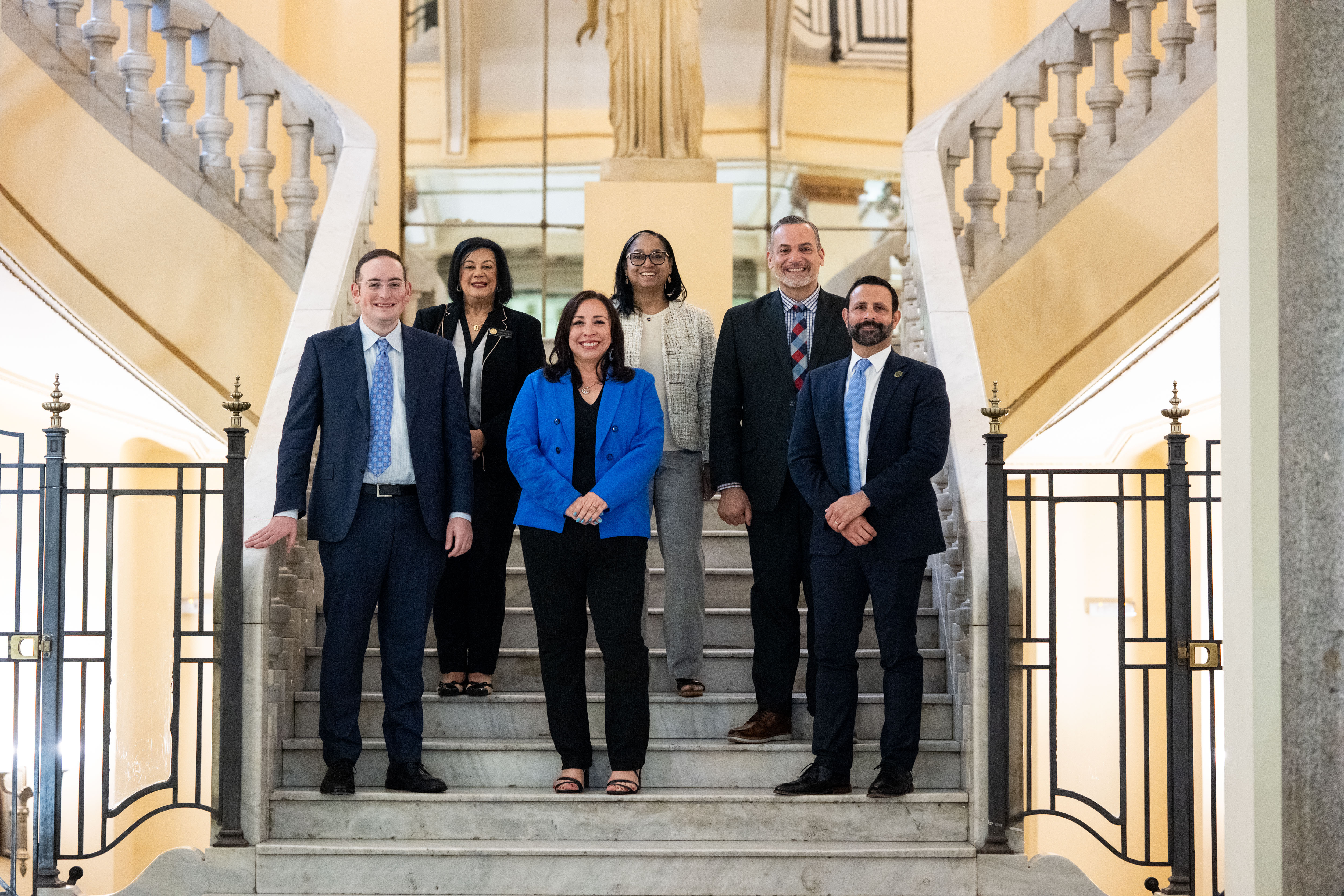State Legislators Talk Energy, Transportation and Culture During Visit to Spain
By Allie Seibel, NHCSL Intern

Rep. Adam Zabner (IA), Rep. Lillian Ortiz-Self (WA), Rep. Angela Romero (UT), Del. Joseline Peña-Melnyk (MD), Rep. Juan Candelaria (CT) and Rep. José Pérez Cordero (PR). Credit: Fundación Consejo España-E.E.U.U.
Download the 2025 Summer Edition here.
Making and fostering connections between state legislatures and Spain was at the forefront of the agenda as members of the National Hispanic Caucus of State Legislators traveled to Spain in May.
President Rep. Angela Romero (UT) and President-Elect Rep. Juan Candelaria (CT) were joined by Rep. Jose Pérez Cordero (PR), Rep. Adam Zabner (IA), Rep. Lillian Ortiz-Self (WA) and Del. Joseline Peña-Melnyk (MD) to form the NHCSL delegation for the trip.
Hosted by Fundación Consejo España - E.E.U.U. the Spanish Ministry of Foreign Affairs, and Spain’s Embassy in the United States, the summit focused on transnational policy building and networking.
Our legislators began their trip in Madrid, visiting the Spanish Congress of Deputies and partaking in a welcome lunch hosted by Casa de América and Secretary of State for Foreign and Global Affairs, Diego Martínez Belío, and Josu Jon Imaz, Chairman of Fundación Consejo España - EE.UU.
“Getting to know each other is the best way to love each other, and we want to deepen the relationship between Spain and the United States, in the social, economic, business and cultural spheres,” said Imaz.
During the first day of policy sessions, focused on energy, our legislators met with the Spanish Wind Energy Association and Iberdrola’s Innovation and Training Center, located in San Agustín de Guadalix, to focus on the importance of renewable energy in Spain, a country that derives nearly 57% of total energy generation from renewables.
“It was very interesting to me because energy is a very hot topic in our legislature back in Iowa this year,” said Rep. Zabner (IA). “There’s Spanish companies that export or that build wind turbines in the state of Iowa. The conversation about the challenges and advantages is so similar to what’s happening back in Iowa.”
Transportation and infrastructure policy was the focus of the next day, as Spain maintains the second-largest high-speed rail network in the world, with visits to the Ministry of Transit and Sustainable Mobility and the Association of Construction and Infrastructure Concession Companies, followed by a reception with the Secretary of State for Transportation and Sustainable Mobility José Antonio Santano Clavero.
“One of the things I campaigned on was trying to bring passenger rail to my community,” said Rep. Zabner (IA). “And that’s something that we struggle with in the U.S., and so that was really impactful, being able to get down to the nitty gritty of how permitting works in this country.”
Legislators also traveled by high-speed AVE rail to Málaga and visited Google’s Cybersecurity Center, followed by a session at the University of Málaga on the importance of Spanish language.
“We’re a global society,” said Rep. Romero (UT). “So, how can we work better together, and how can we as states work with Spain and particularly the diplomats here in providing renewable energy, using them as resources for high-speed rail, and all those policy pieces. But really [the important thing] is the connection, following your bloodlines and learning about your roots.”
The final day of the summit focused on Spain’s role in our Nation’s independence. Legislators participated in a reception from Málaga Mayor Paco de la Torre before traveling to Macharaviaya, the birthplace of Bernardo de Gálvez, a legendary figure in the Revolutionary War for his role in denying the British forces access to American colonies from the south. Gálvez was declared an Honorary Citizen of the United States by a congressional law in 2014 and is one of only seven individuals in history to be granted honorary citizenship.
Legislators departed Spain with resources for their constituents and a reaffirmed commitment to the importance of United States-Spain relations at the state level.
“I would say that the thing that has been enhanced the most for me is how connected we really are,” said Rep. Ortiz-Self (WA) of the trip. “We seem to think we’re such different countries and continents, but in reality, our businesses are transatlantic. We are partnering in so many ways, in business, education, and infrastructure.”
